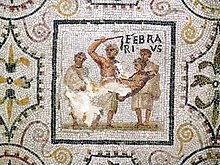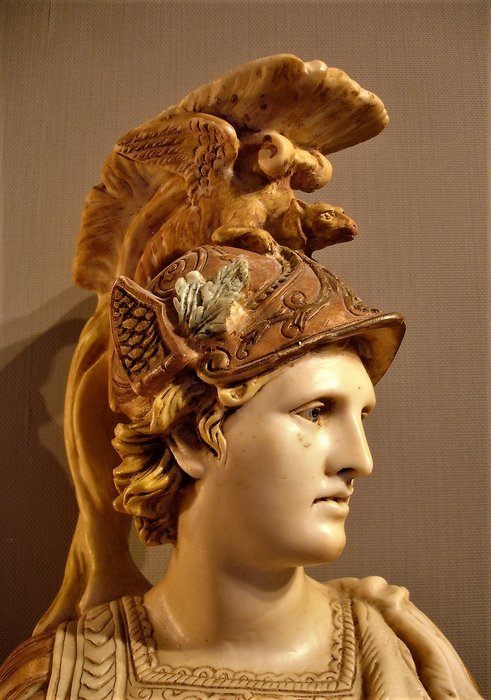Sunday Special--How did the Months get their Names?
How did the months get their names?
As the new year starts you might have recently bought a new diary or
calendar and thought ‘Where do these words come from?’ – at least that’s
what I did. There is also, of course, also the chance that you have
been merrily scheduling in gym appointments and
book clubs and all sorts of other details relating to New Year’s
resolutions (have you kept yours so far?) but we’ll take the opportunity
to add a resolution to your list: learn where we got the names for all
the months of the year. Spoilers: it’s a mixture
of gods, rulers, and numbers.
January

January is names after the Romans God Janus. He had two faces: one that looked to the past, one that looked to the future.
January is named after the Roman god Janus, who
presided over doors and beginnings – appropriately enough, for the
beginning of the year (though this is, as you will discover, not as
straightforward as it seems). Indeed, Janus was usually
depicted with two faces looking backwards and forwards, as is often
characteristic of a new year; this also gave rise to the term
Janus word for
words that have two opposite meanings.
February

February is ultimately based on Latin februarius, from februa. In case that’s not helped things become clearer,
februa was the name of a purification feast held on the 15th of this month.
February is a
divisive issue in modern pronunciation, with both Feb-yoo-ary and
Feb-roo-ary being commonly heard.
March

Which god gets a planet and a month named after him? You’ve guessed it: Mars. Why him? As the
Oxford English Dictionary notes, ‘In ancient Rome several
festivals of Mars took place in March, presumably in preparation for the
campaigning season, since Mars was a god of war.’
April

Aphrodite --Goddess of Love
We know that the English word April comes from the Latin Aprillis,
the fourth month of the ancient Roman calendar, but things are less
clear after that. In Old English, April was also sometimes called
Eastermonab, ‘Easter month’.
May
Goddess Maia
The month is connected with the goddess Maia. Perhaps less well known
now than the other deities with months named after them, Maia (in Greek
mythology) was daughter of Atlas and mother of Hermes. She was
considered a nurturer and an earth goddess, which may
explain the connection with this springtime month. Although may is a
common modal verb, the month and the word are unrelated.
June

Having conceded one month to a Greek deity, we’re now back with the
Romans: June is named after the ancient Roman goddess Juno, wife of
Jupiter and goddess of marriage and childbirth. June was also once
sometimes known as
midsummer month.
July

Julius Ceasar
The first month in the calendar named after a real person, July
was named in honour of Julius Caesar after his death in 44 BC, July
being the month of his birth. Before it was renamed, the month was known
as
Quintilis (borrowed into English as Quintile), which
means ‘fifth’. If you’ve been counting, you’ll know that July isn’t the
fifth month: we’ll come on to that when we reach September and October.
August
Emperor Augustus
Following suit, in 8 BC, the month Sextilis (‘sixth’) was
renamed after Augustus, the first Roman emperor, who had died six years
earlier. Augustus himself was given this title when he became emperor,
having previously been known as Octavian. It came
from the Latin augustus meaning ‘consecrated, venerable’ which gave rise to the English adjective
august, ‘respected and impressive’.
September
September follows on from Quinitlis and Sextilis, in that it comes from the Latin
septem, ‘seven’ (VII) As with those (and the rest of the
calendar), the numbering is a bit off now: September was originally the
seventh month in an ancient Roman ten-month calendar, which started with
March.
October
More of the same: octo is the Latin for ‘eight’ (VIII) for that
ten month calendar. Two months were added to the end of the calendar
year around 713 BC, and the beginning of the year was moved to 1 January
in 153 BC.
November
The pattern continues: November comes from novem, ‘nine’.(IX) November
is also, we’re afraid, used ‘with allusion to November’s position at
the end of the year,{(XI) Undecim} and to the characteristic greyness,
gloominess, etc., associated with it
in the northern hemisphere’. The earliest known example of this
allusive use comes from Jane Austen’s posthumously published novel
Persuasion.
December
And we finish off the year with December, from decem, ‘ten’. {(XII) Duodecim}The month also comes with a brace of adjectives:
Decemberish and Decemberly, the latter of which can also be used as an adverb. And there you have it:
Comments
Post a Comment